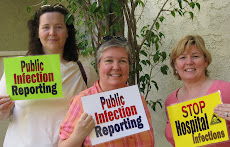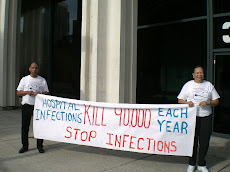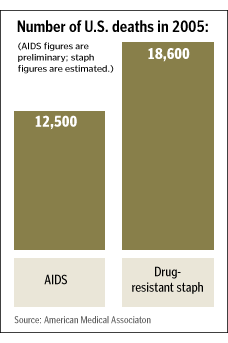Hospital infections might be disclosed
Rates at institutions would be available for public to review
Saturday, May 10, 2008 3:13 AM
By Misti Crane
THE COLUMBUS DISPATCH
As Nancy Oliver spoke of her father's stay in an intensive-care unit, and of the infection that eventually killed him, her voice was calm, her delivery direct.
She wanted the people who are to tell Ohioans more about what goes on in hospitals to understand what it's like to love someone and watch him suffer, she said.
"I'd like you to understand the heavy burden placed on consumers of health care when these infections do strike," Oliver said.
Her father, Robert Totsch, was 75 when he died in November 2006 at Riverside Methodist Hospital, according to an obituary that ran in The Coshocton Tribune.
After heart surgery, Totsch developed a drug-resistant staph infection that started at his surgery site and spread to his blood, she told the Hospital Measures Advisory Council, a group created by state law and charged with recommending public reporting of various measurements of hospitals, including infection rates.
He also ended up infected with the sometimes-deadly intestinal bacteria Clostridium difficile, also known as C. diff, she said.
"My dad suffered greatly as he tried to beat these infections," Oliver said before hearing the panel members agree to recommend reporting of a list of hospital data, including rates of staph and C. diff infections.
After the vote, she wept.
The panel has to make its recommendations to Dr. Alvin Jackson, the director of the Ohio Department of Health. Public hearings and approval of the final rules are to follow.
Based on the current schedule, data should be available for public perusal as soon as October 2009.
A second phase of reporting requirements is to follow in 2011, said Madelyn Dile, the panel's facilitator and assistant chief of the state Health Department's quality-assurance division.
C. diff and methicillin-resistant Staphylococcus aureus, or MRSA, have been a particular concern for both infectious-disease specialists and the public as severe, sometimes-deadly, infections have been diagnosed in increasing numbers of hospital and nursing-home patients.
C. diff used to be a relatively minor problem, but it has grown increasingly menacing, with the bacteria producing toxins that can cause severe bowel infections, said Dr. Forrest Smith, medical director of the state Health Department's prevention division. He was part of a committee that recommended measures to the panel.
In a first-of-its-kind effort to quantify the reach of C. diff, the state found more than 15,000 cases in hospitals and nursing homes in 2006.
Staph infections "tend to ride in on instruments of medical progress," said Dr. Steve Schmitt, an infectious-disease expert from the Cleveland Clinic.
"It colonizes 46 of every 1,000 patients, so it's a big problem."
The Ohio Hospital Association is in favor of reporting information that can help consumers, said spokeswoman Tiffany Himmelreich.
But the group will closely watch and argue for reporting requirements that meet several standards, she said. The benefit to consumers should exceed the cost to hospitals, the state should use widely accepted definitions of C. diff and drug-resistant staph infection, and the rules should be careful to distinguish hospital-acquired infections from those brought in from elsewhere, she said.
mcrane@dispatch.com
Subscribe to:
Post Comments (Atom)









No comments:
Post a Comment